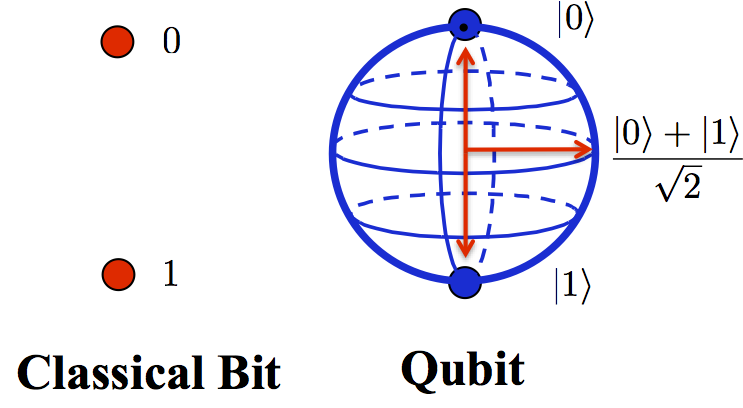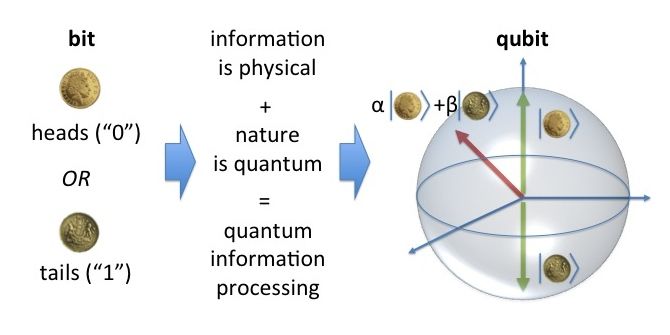IBM promises first commercial quantum computers in a few years.
It will not outperform conventional computers, at least not yet. But the company says that the system will be crucial in developing a market for future quantum machines that can handle complex calculations currently out of reach of classical computers. The cloud service is the latest salvo in the heated battle to build a useful quantum computer.
Nice, but how do quantum computers work?
Common digital computing requires that the data be encoded into binary digits (bits), each of which is always in one of two definite states (0 or 1), quantum computation uses quantum bits (qubits), which can be in superpositions of states.
Quantum bit is a basic unit of quantum information. It is a two-state quantum-mechanical system, such as the polarization of a single photon: here the two states are vertical polarization and horizontal polarization. In a classical system, a bit would have to be in one state or the other. However, quantum mechanics allows the qubit to be in a superposition of both states at the same time, i.e. qubit can hold one, zero or linear combination of one and zero.

The homogeneity and additivity properties together are called the superposition principle. A linear function is one that satisfies the properties of superposition.
Additivity: F(a+b)=F(a)+F(b) Homogeneity: F(ab)=aF(b) Quantum superposition is a fundamental principle of quantum mechanics. It states that, much like waves in classical physics, any two (or more) quantum states can be added together ("superposed") and the result will be another valid quantum state; and conversely, that every quantum state can be represented as a sum of two or more other distinct states.
Information is that which informs. In other words, it is the answer to a question of some kind. At its most fundamental, information is any propagation of cause and effect within a system.
Quantum information is information that is held in the state of a quantum system.

In Dynamical systems, a state is a fixed rule describing the time dependence of a point in a geometrical space.
Quantum state refers to the state of an isolated quantum system. A quantum state provides a probability distribution for the value of each observable, i.e. for the outcome of each possible measurement on the system. Knowledge of the quantum state together with the rules for the system’s evolution in time exhausts all that can be predicted about the system’s behavior.
Quantum system is a system which obeys laws of the quantum mechanics.

IBM has set up a new division, IBM Q, that is intended to make 50-qubit universal quantum computers and sell them commercially in the next few years.
Until now, quantum computers have mostly been a much hyped but long away dream. But IBM believes they are close enough to reality to start work on getting software ready for when they become commercially available.
So far, IBM has demonstrated systems that use quantum effects in small-scale demonstrations. They have taken advantage of effects like superpositioning, behaviour that could in the future be harnessed to allow them to work in far more complex ways than today’s computers.
Meanwhile, it is working on signing commercial deals with a handful of customers this year for access to an experimental quantum system.
This will not itself be powerful enough to have any commercial uses, but will give customers a chance to learn how to program the system, getting them ready for the more practical systems that are predicted to follow soon after.
IBM’s move comes as Google is racing to create its own machine using 50 quantum bits — the point at which a quantum computer would be able to handle more complex calculations than today’s supercomputers. Microsoft has also been working on developing quantum technology, though it has picked a more radical design for its qubits that has yet to show results outside the lab.
The effort to attract customers who want to program its machine makes IBM the only big tech company to have started building a broader ecosystem around its quantum technology.
Sources: Independent, Scientificamerican, Cecile G. Tamura fb